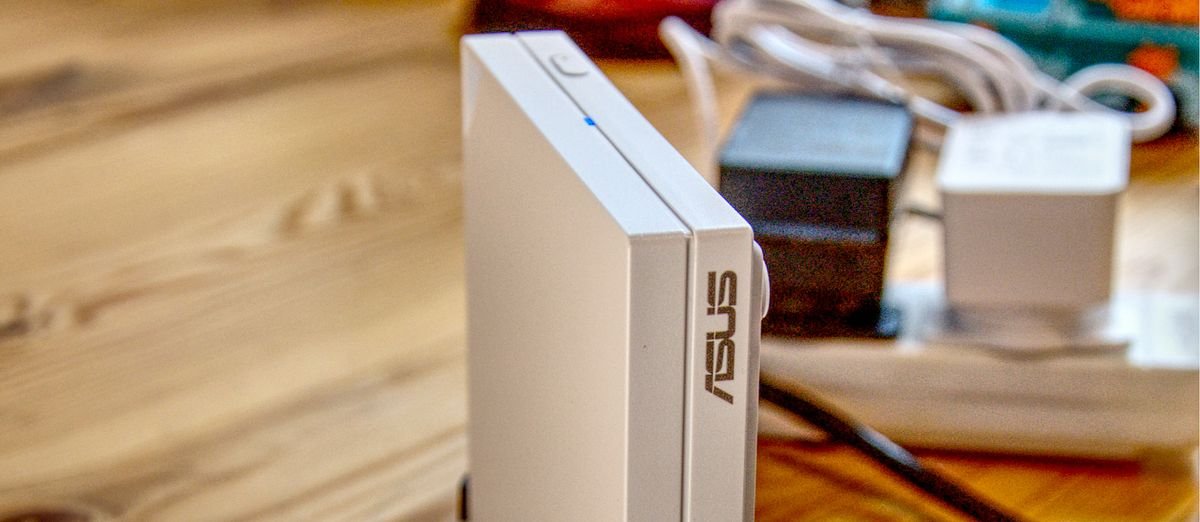Asus RT-AX57 Go: 30-second review
Router makers are always keen to jump on the latest version of the 802.11 standards, yet they aren’t especially keen on making devices easily transportable.
Therefore, if you search for portable WiFi routers, you often find either low-spec devices designed for hotel room use or painfully expensive options.
However, the Asus RT-AX57 Go contradicts those expectations by offering a decent capability and being rather cheap.
The typical cost of the Asus RT-AX57 Go is $130, and for that outlay, you get an 802.11ax router with an AX3000 spec powered by a dual-core 1.3GHz SoCw with 256 MB Flash and 512 MB RAM.
This is a dual-band router with 2X2 on both 2.5GHz and 5GHz antenna, and it has all the standard Asus router Core Features. These include Advanced VPN (WireGuard and OpenVPN server or client supported), AiProtection, Parental Control, QoS and AiMesh.
It is slightly less impressive because it only offers two LAN ports, one for WAN use. Therefore, this router is generally for WiFi-connected clients unless you want to carry a network switch along with it.
But if that’s not a problem, this is a small and easy-to-deploy WiFi router that provides all the technology that most people might want to take on a trip at a fraction of what some brands are asking.
The only way it might be better was if it ran off a battery, although as it uses 9V 2A USB-C, there are many portable power packs that should work with it. And, its great that you can also use the PSU to charge other USB-C devices.
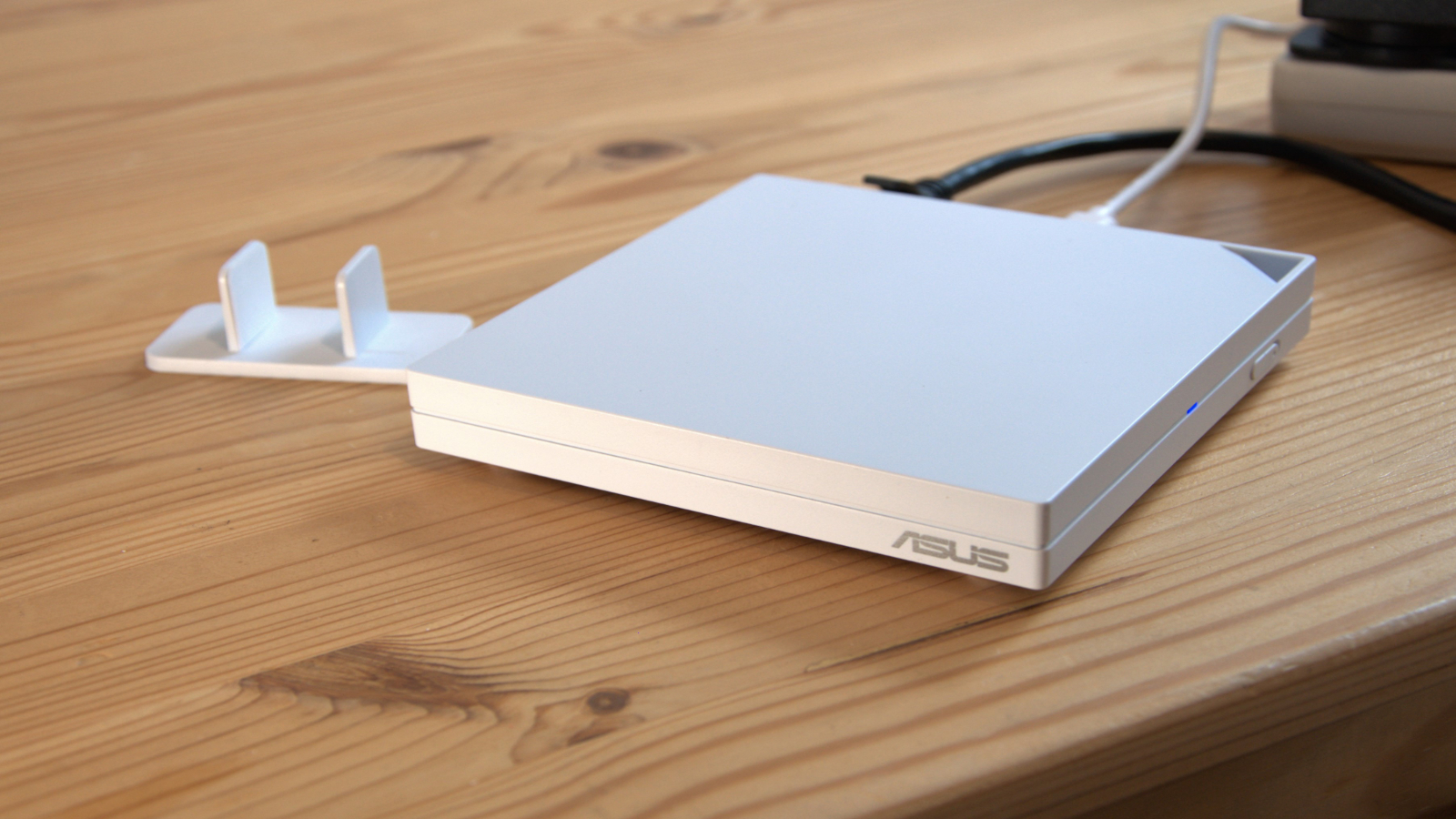
Asus RT-AX57 Go: price and availability
- How much does it cost? From $130
- When is it out? Available now
- Where can you get it? Most online retailers carry this product
Like most Asus routers, the Asus RT-AX57 Go can be found in most mainstream online retailers. The Amazon.com price is $129.99 in the USA, and the UK cost is even more competitive at just £80.99.
It is possible to find cheap AX3000 routers for less, like the TP-Link Next-Gen WiFi 6 AX3000, but that’s not specifically made for easy transportation.
However, the product it is closest to in spec and size is the Netgear Nighthawk M6, which inexplicably is priced at £677.65 in the UK and $649.99 in the States. I’m not sure why anyone would buy the M6 at that price, but it does include a 5G model for that excessive amount.
For the money and features, the Asus RT-AX57 is a relative bargain. And that’s not something we often say about Asus-branded products.
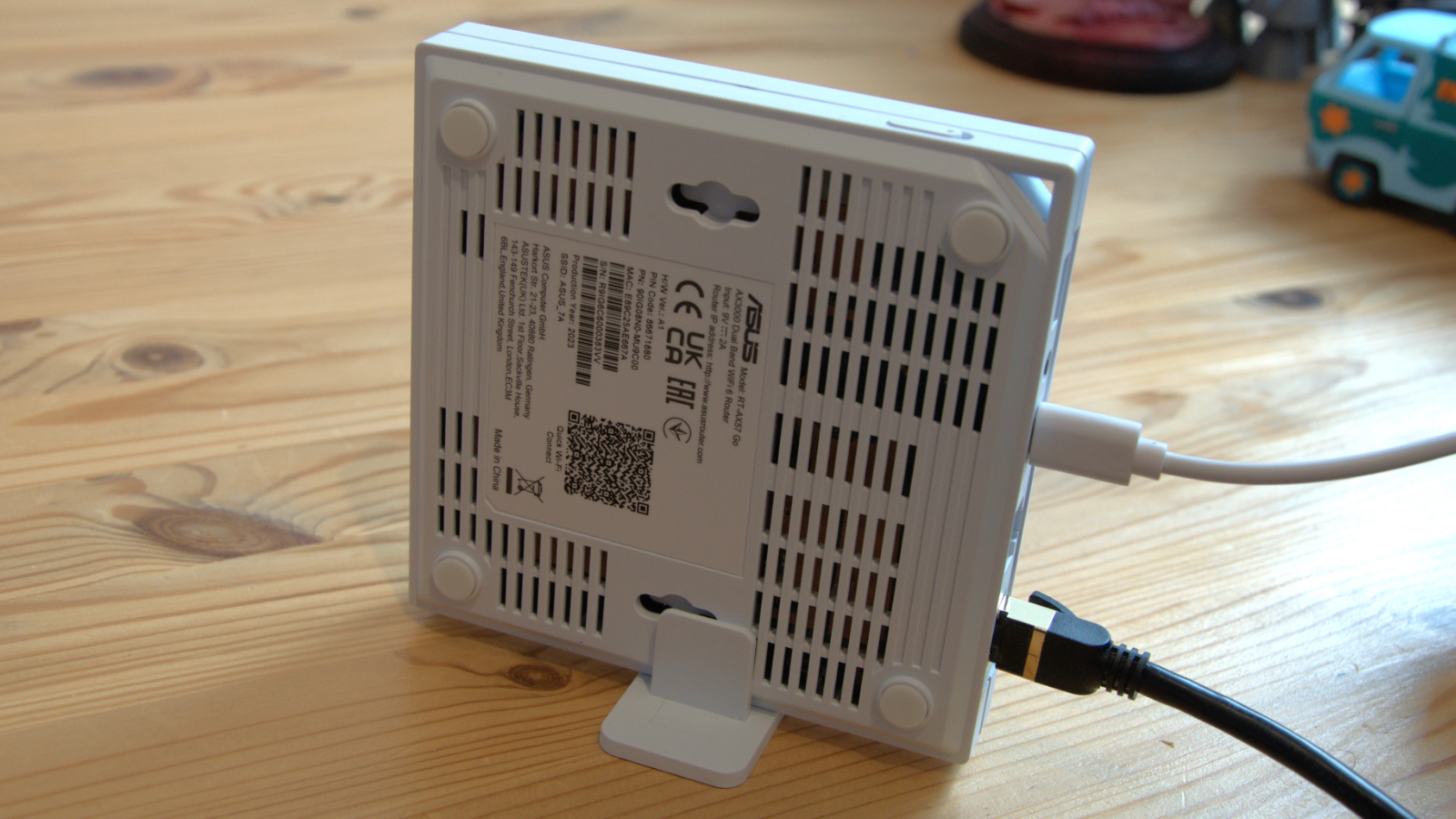
Asus RT-AX57 Go: Specs
| Item | Spec |
|---|---|
| Model: | RT-AX57 Go |
| CPU: | Dual-core 1.3GHz SoC |
| RAM: | 512 MB RAM |
| Storage: | 256 MB Flash |
| WiFi: | 2.4GHz 2×2 AX: Up to 600Mbps (20/40 MHz)5GHz 2×2 AX:Upto2.4Gbps (20/40/80/160MHz) |
| 802.11: | 802.11a/b/g/n/ac/ax |
| Security: | WPA,WPA2,WPA3 |
| Cellular Modem: | N/A |
| Modes: | Mobile hotspot (using cellular tether via a phone)WiFi (AiMesh) router/(AiMesh node)WiFi repeater (WISP mode)WiFi bridgeWiFi access point |
| LAN: | 1x WAN, 1xLAN (1GbE) |
| PSU: | 19V 2.A 18W |
| Dimensions: | 120 x 120x 21.5 mm (4.72 x 4.72 x .85 in) |
| Weight: | 200g |
Asus RT-AX57 Go: Design
- CD case sized
- Mounting options
- Limited LAN ports
As wireless routers go, the RT-AX57 Go is remarkably small. It is about the same size and thickness as a double CD case, if you remember those.
Asus always uses very high-quality mouldings, but this device is unashamedly plastic, and the white colour effortlessly highlights any damage or marks. In the box is a USB-C power supply that comes with regional adapters for different outlets.
Being only small and square, this router has plenty of orientation options with no specific way up that you must put it. It can sit on the four rubber feet on the underside, be mounted to a wall with lugs, or you can install a small plastic foot for vertical orientation.
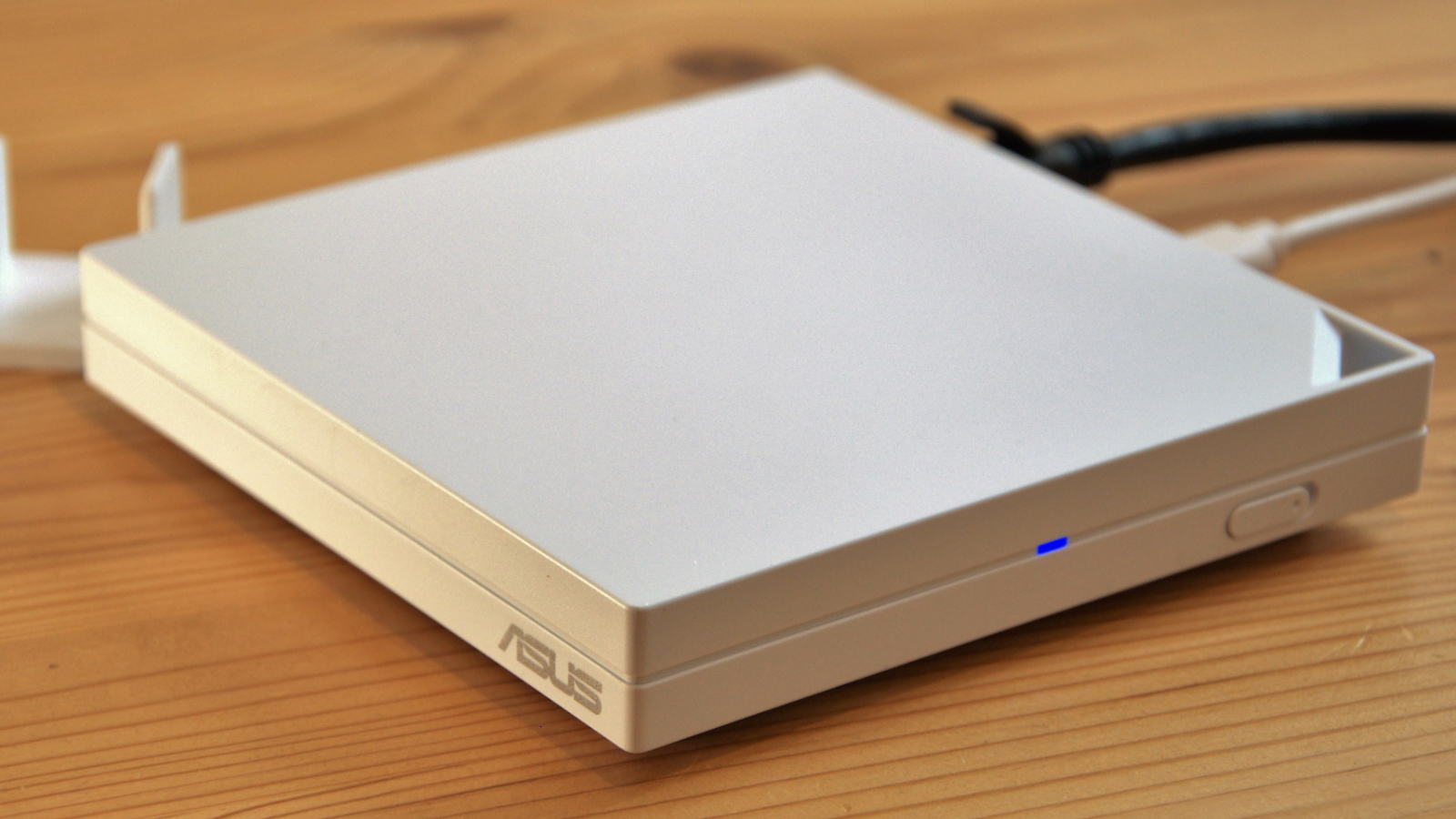
One curiosity about the design is that there is a triangular hole in one corner that’s remarkably similar to the one Crucial used on its recent X9 Pro and X10 Pro external SSDs.
Except in that instance, the pocket created was a clever means of including an activity light without drilling a hole in the outer cover. From what your reviewer can determine, it serves no useful purpose here.
When standing vertically, the router’s top has a small blue power LED and a slide switch. The rear has a single USB 3.2 Gen 1 Type-A port, a reset button, a USB-C power port, and two Ethernet RJ-45 LAN ports. One of the LAN ports is meant for the WAN, and the other for the LAN. Both these ports are gigabit, and at this price, getting 2.5GbE LAN was probably impossible.
The limited ports dictate if you intend to connect more than one device to this router by Ethernet, you will be required to carry an additional switch to cascade the network.
There isn’t much more to say about the RT-AX57 Go, other than it’s passively cooled, so it is entirely silent in operation.
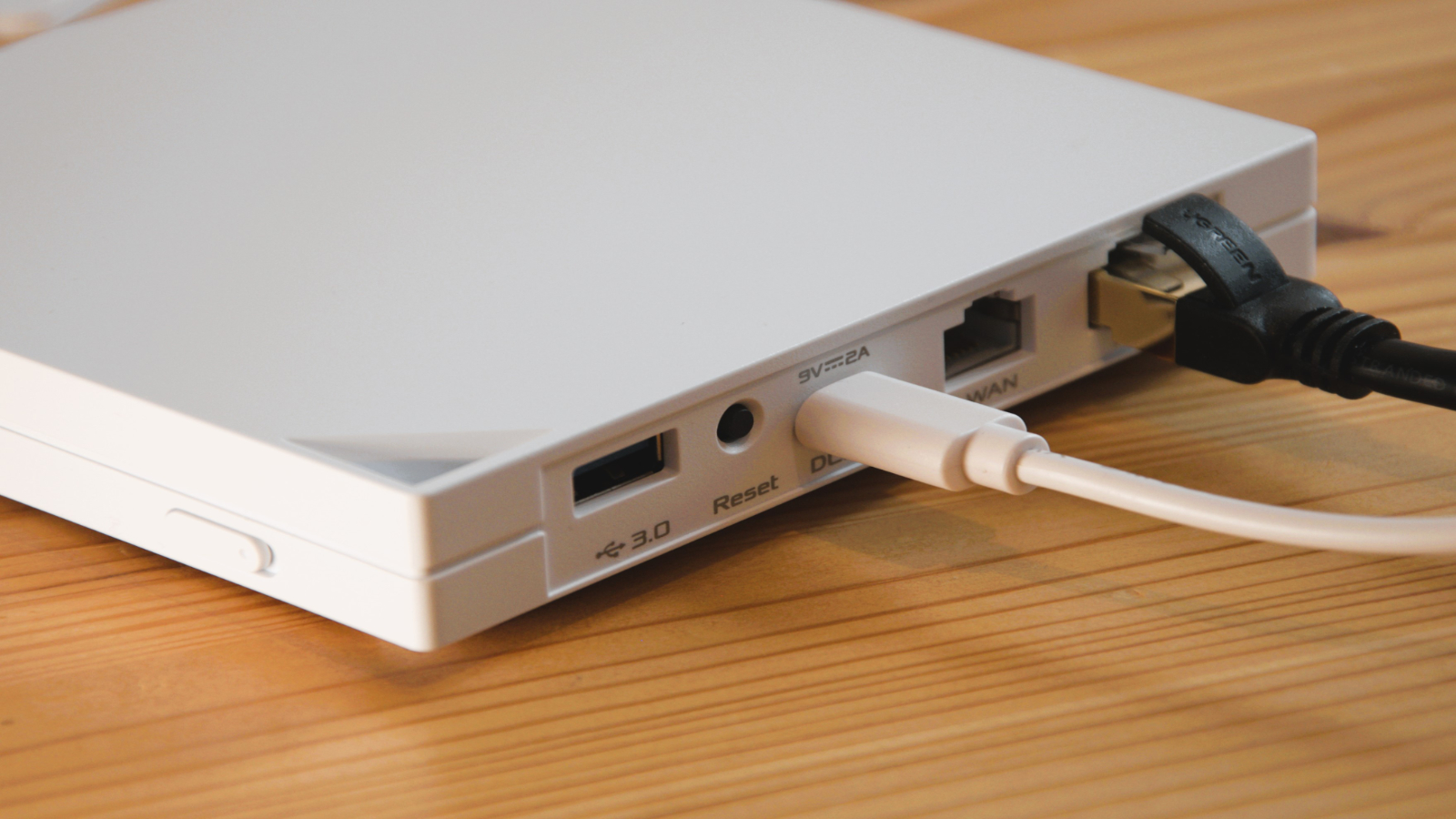
Design score: 4/5
Asus RT-AX57 Go: Features
- Six router functions
- Slow USB
- Mobile application
Most travel routers focus on the critical functionality that most people want, specifically being an Access Point to a hotel wired internet connection or a portal to a WISP service.
However, this hardware has six modes: operating as a conventional wireless router, an access point, a wireless repeater, a media bridge, an AiMesh node, and a public access point(WISP). In addition, the USB port allows a phone to be connected to other devices to distribute its mobile service connection.
That’s more functionality than many dedicated home routers come, and this functionality makes the RT-AX57 Go much more likely to be repurposed if you aren’t travelling.
The Mesh node is compatible with the Asus AiMesh infrastructure, and it can operate either as the master node or as a satellite.
Cheaper routers tend to compromise on security features, but this one has VPN options that support both VPN Fusion and Instant Guard.
One feature that really stood out in the specifications was one long complaint about many routers: the USB port.
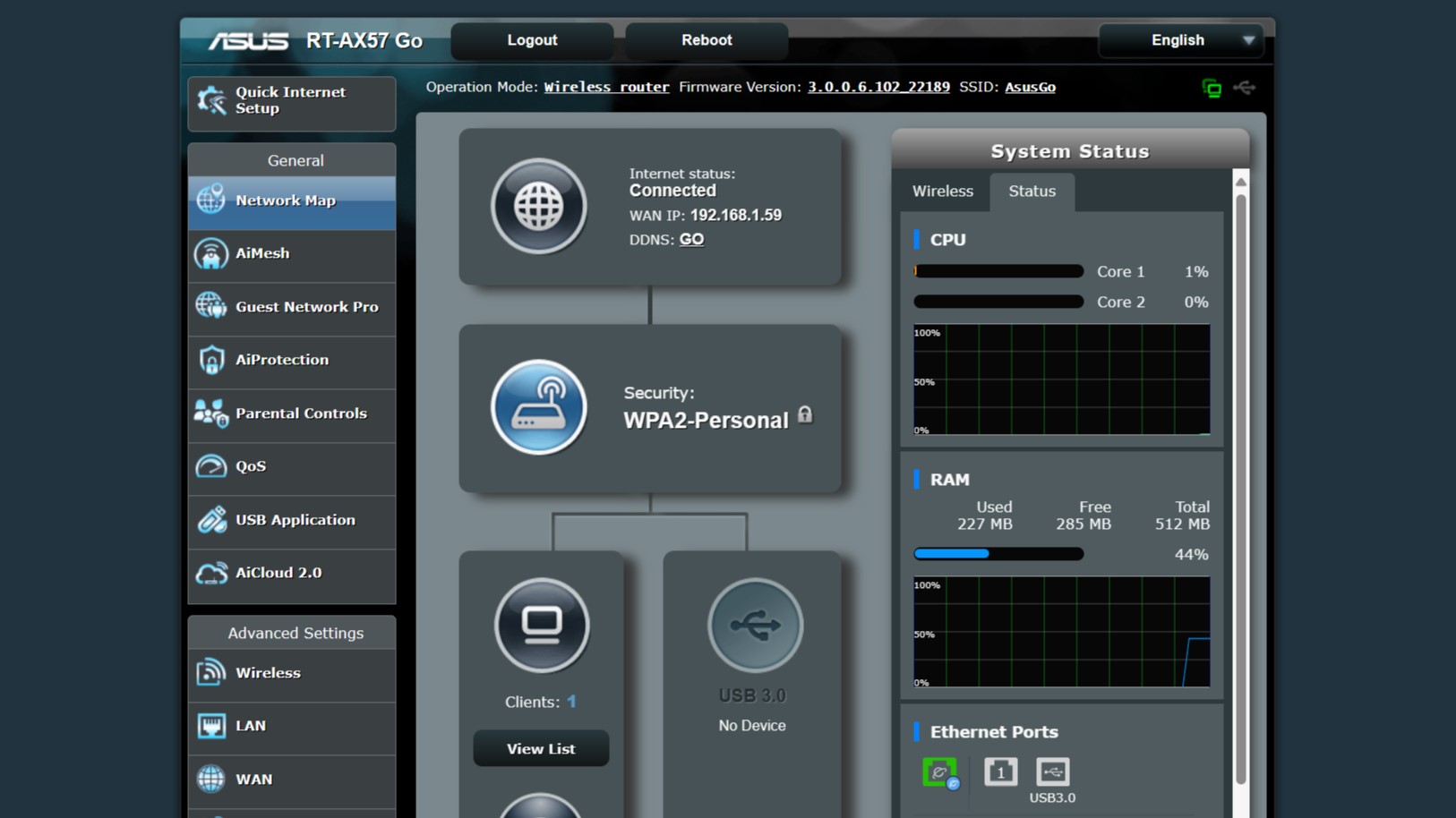
Typically, router makers put a USB port on routers and promote the idea that this can operate as a mini NAS with external storage. In reality, many of these ports are USB 2.0, and the best transfer speeds you will see are 40MB, making them largely useless for large files. However, on this router, the port is USB 3.2 Gen 1, so expectations were elevated.
However, in our tests, file transfers were capped at 40MB/s when using a Crucial X6 SSD connected to the port. That begs the obvious question for Asus: Why say it was USB 3.2 Gen 1 and then only run the port in USB 2.0 mode?
If the USB port is disappointing, the highlight is undoubtedly the phone application Asus suggests you use to configure the router.
Almost every function that can be accessed from the web interface is available through the app, and it even has a scanning function to speed up connecting using a QR code placed on the underside of the router.
One word of warning for those attaching this device to an existing network, don’t connect it and then try to configure. By default, the router comes set as a wireless router with DHCP enabled, and if you connect it to an existing solution, this router will intercept DHCP calls and suddenly, computers on the network won’t be able to find each other.
If this is the only router and DHCP service on the network, then there isn’t an issue, but those deploying this as a repeater or mesh node need to be careful not to create an issue across the network. Don’t ask how we know this.
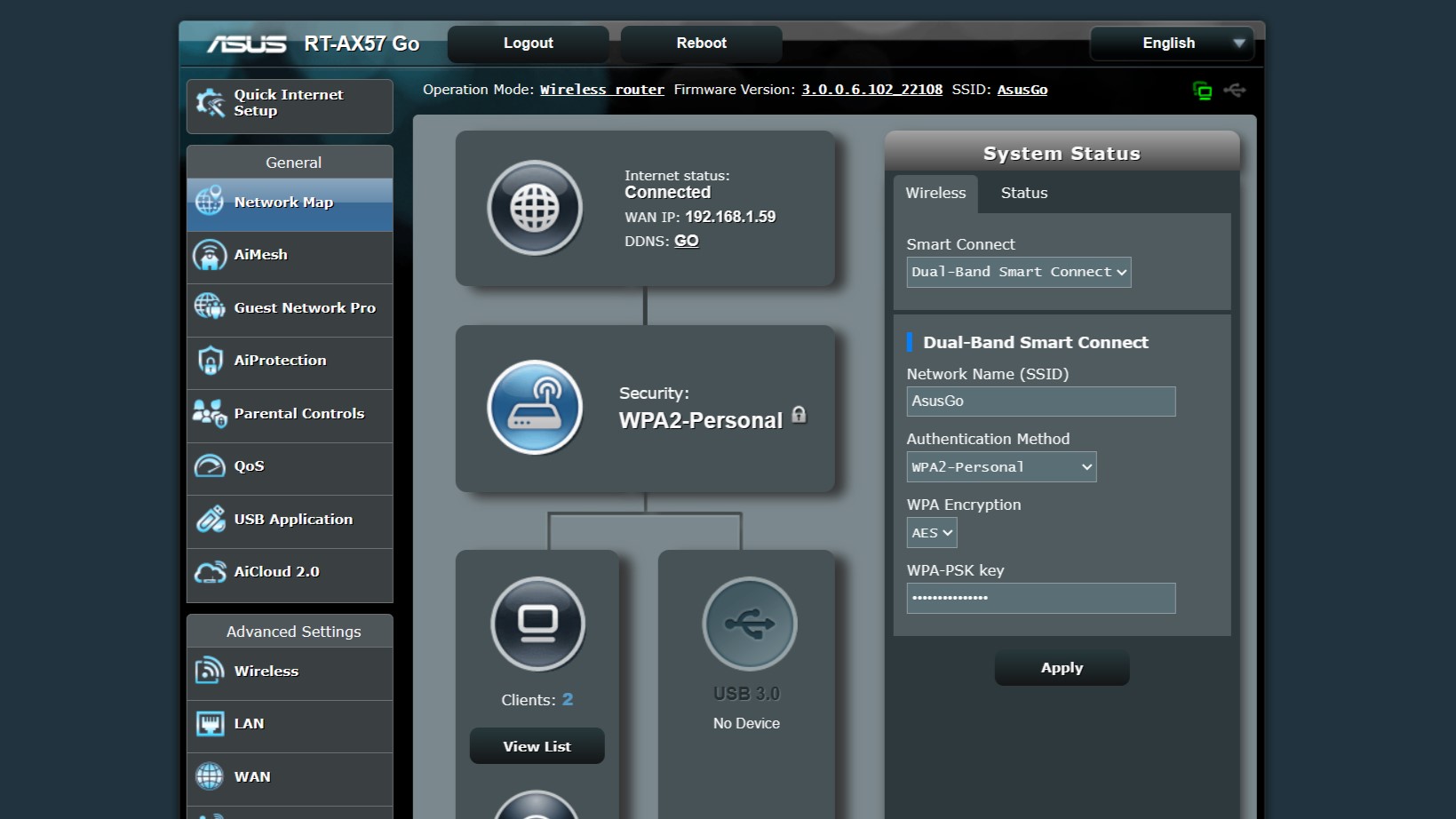
Asus RT-AX57 Go: Performance
- Good for WiFi 6
- Less speed for earlier technologies
With an AX3000 specification, this router can deliver up to 600Mbps over 2.4GHz 2×2 and another 2.4Gbps over 5GHz 2×2. But then there aren’t many adapters that can connect 2×2 on both frequencies, and the best speed across the wired network is 1Gbps. Theoretically, it should be possible to get at least 1.5Gbps between two wireless connected devices at close range, but that’s only around 200Mb/s.
These general numbers aren’t special to this router but common to any wireless router that carries the AX3000 label.
What’s important to consider is that because this is a travel router and typically destined to work within a single small hotel room, it has the best opportunity to achieve those objectives compared to a router in a home that must deal with multiple rooms and floors.
That said, the performance of this router at short range is exceptionally good, with it achieving more than 850mbits per second using WiFi 6 (AX 2.4GHz). It works just as well when using 4X4 802.11ac.
There are two weaknesses to the wireless performance. The first is that this router doesn’t support 6GHz, which would have opened up even more significant amounts of bandwidth. The other is that while it was good at exploiting 802.11ac and ax, it seemed significantly less agile when confronted with older 802.11n and 802.11g.
These modes do work, but the tweaking that the Asus wireless engineers did on the heading protocols weren’t replicated with the older versions of 802.11.
For those still using devices that only support these wireless networking protocols, perhaps it’s time you upgraded them before investing in a new portable wireless router?
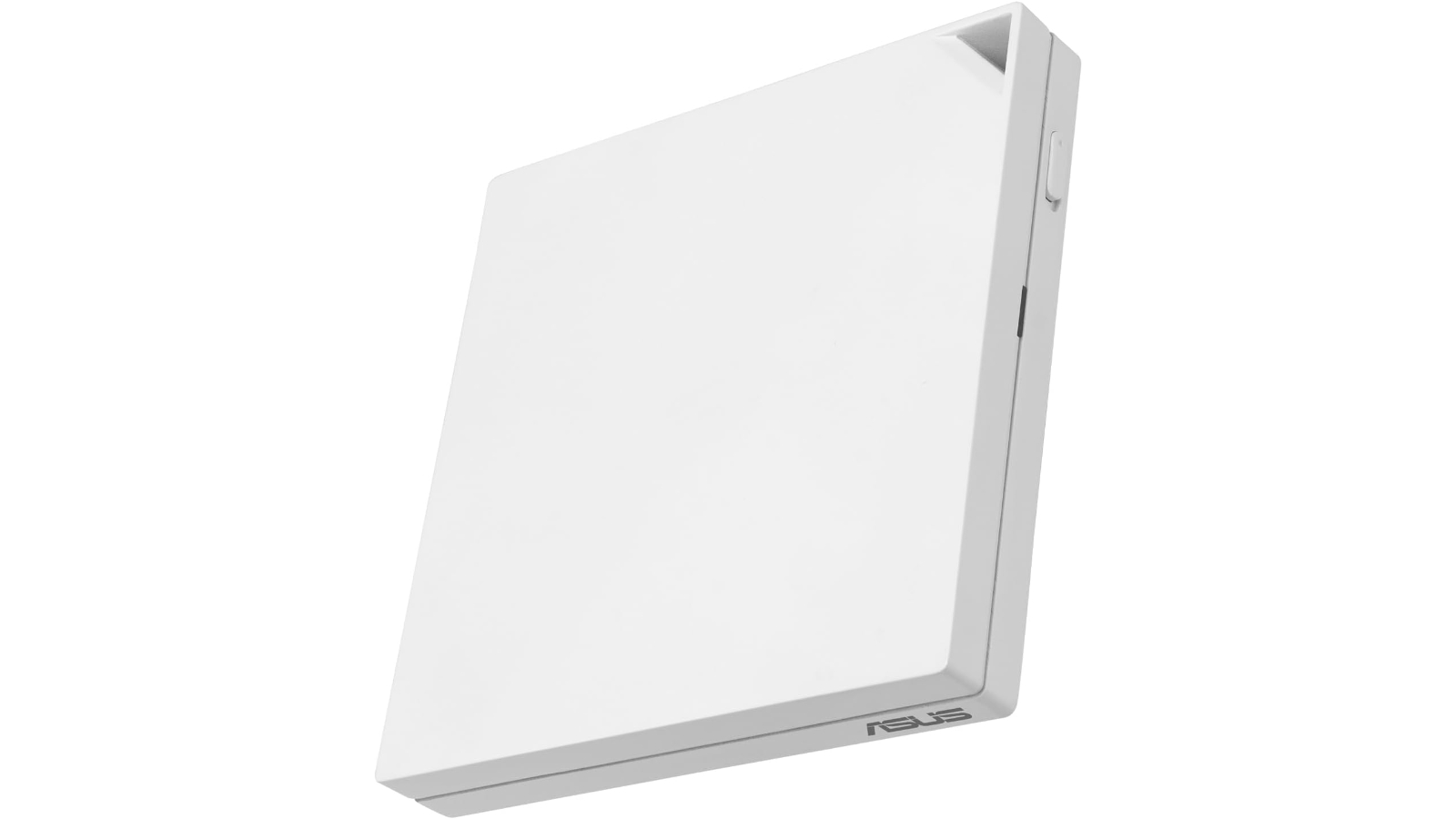
Asus RT-AX57 Go: Verdict
Overall, it’s hard not to be impressed by such a small router overflowing with features.
We’ve reviewed travel routers previously, and they didn’t support Mesh or have USB file sharing like this one does.
Perhaps Asus needed to be more selective about what features they put in this router because it is a bit overwhelming for the average user.
Support for 6GHz would have been ideal, but it’s hardly a necessity considering the limited number of wireless adapters that support it. And, can router makers stop claiming USB specifications that they then fail to implement?
For the money, this is a great travel router if you have the knowledge to fully exploit its capabilities.
Should I buy a Asus RT-AX57 Go?
| Attributes | Notes | Rating |
|---|---|---|
| Value | Considering the high price of some portable routers, this is reasonably priced | 4/5 |
| Design | Its small, but the limited LAN ports are the only real problem | 4/5 |
| Features | Packed with features, more than any other portable router we’ve tested | 4/5 |
| Performance | Good performance on WiFi 5 and 6, where you need it | 4/5 |
| Overall | An impressive performer for such a small router | 4/5 |
Buy it if…
Don’t buy it if…
Didn’t find what you wanted? Check out our selection of the best business routers

